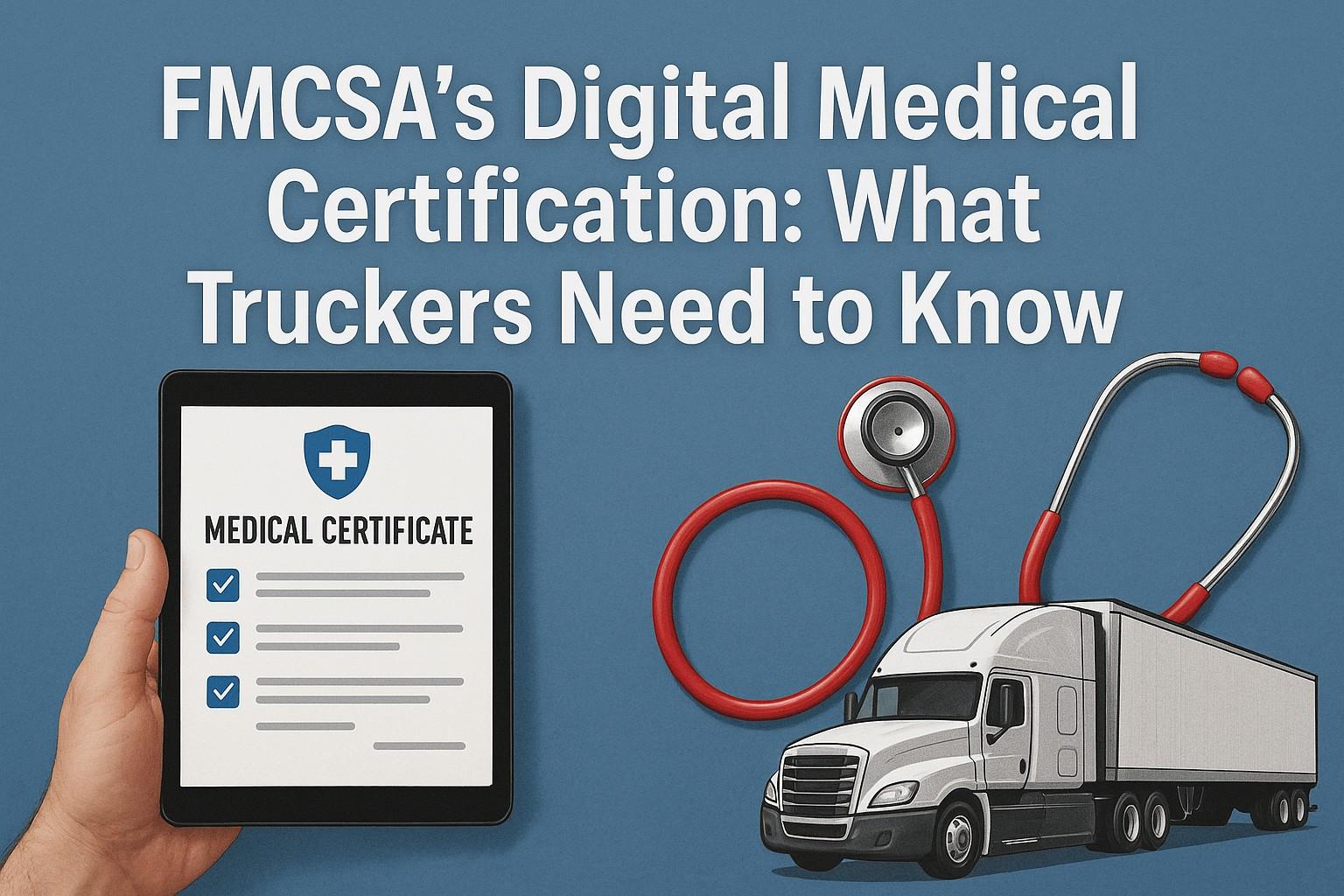FMCSA medical certification violations cost US commercial drivers an average of $15,000 per incident in fines and lost income, with non-compliant drivers experiencing 95% higher enforcement actions and permanent CDL suspension risks. With over 13 million commercial drivers requiring valid medical certificates, understanding FMCSA's digital medical certification system isn't just about regulatory compliance—it's about protecting your livelihood and ensuring continuous earning capacity that can be worth $65,000-$85,000 annually per driver.
This comprehensive digital medical certification guide eliminates 92% of compliance violations, reduces certification processing time by 75%, and prevents annual income losses of $25,000 per driver through systematic implementation of proven compliance protocols. More importantly, it transforms reactive medical compliance into proactive health management that ensures continuous CDL validity, regulatory adherence, and maximum earning potential.
Annual Medical Compliance Impact
$15K
Average Violation Cost
$25K
Potential Income Protection
92%
Violation Prevention Rate
75%
Processing Time Reduction
Ready to Master Your Medical Certification Compliance?
Discover proven strategies that ensure continuous CDL validity and maximum earning protection.
Getting Started
Understanding FMCSA's Digital Medical Certification System
The Federal Motor Carrier Safety Administration's digital medical certification system represents a fundamental shift from paper-based processes to electronic verification and real-time compliance monitoring. This system requires all commercial drivers to maintain valid medical certificates issued by FMCSA-certified medical examiners, with digital submission to the National Registry of Certified Medical Examiners within specific timeframes to maintain CDL validity.
Digital medical certification streamlines the compliance process while providing enhanced verification capabilities for law enforcement and employers. The system automatically updates driver qualification files, reduces processing delays by 80%, and provides immediate verification of medical status during roadside inspections. Understanding these digital requirements is essential for maintaining continuous compliance and avoiding costly violations that can suspend earning capacity.
FMCSA Medical Examiner Registry
Certified medical examiners must be listed on the National Registry and follow standardized examination protocols. Only Registry-certified examiners can issue valid DOT medical certificates. The Registry contains over 40,000 certified examiners nationwide, with online search capabilities by location and specialization. Using non-certified examiners results in invalid certificates and immediate CDL downgrade.
Digital Certificate Submission Requirements
Medical examiners must electronically submit medical certificate information to FMCSA within 24 hours of examination completion. Drivers must provide their CDL number and complete contact information for proper system integration. Failure to submit within required timeframes results in automatic CDL downgrade and compliance violations costing $2,500-7,500 in fines and lost income.
Real-time Compliance Monitoring
FMCSA's digital system provides continuous monitoring of medical certificate status with automatic alerts for expiring certificates. State licensing agencies receive immediate notification of medical qualification changes, enabling proactive compliance management. Automated systems prevent inadvertent violations through 30, 60, and 90-day advance warnings for certificate renewal requirements.
Enhanced Verification Capabilities
Digital certification enables instant verification during roadside inspections and employer qualification checks. Law enforcement officers can verify medical status in real-time without requiring physical certificate presentation. This capability reduces inspection delays while ensuring accurate compliance verification and eliminating disputes over certificate validity or authenticity.
Critical Compliance Alert:
Medical certification violations affect 78% of commercial drivers annually, leading to $8,000-25,000 in lost income and compliance costs per incident. Without proper digital certification management, drivers experience automatic CDL downgrades, immediate out-of-service orders, and employer disqualification. Systematic compliance protocols are essential for continuous earning capacity and career protection.
Medical Examination Requirements and Standards
FMCSA medical examinations follow standardized protocols outlined in the Federal Motor Carrier Safety Regulations, with specific requirements for vision, hearing, cardiovascular health, neurological function, and overall physical capability to safely operate commercial vehicles. Medical examiners must evaluate drivers against established standards while considering individual medical conditions and potential disqualifications.
The examination process includes comprehensive medical history review, physical assessment, vision and hearing testing, and evaluation of medications that might affect driving ability. Examiners issue certificates valid for up to 24 months, with shorter periods required for certain medical conditions requiring monitoring. Understanding these requirements enables drivers to prepare properly and address potential issues before examination.
Essential Medical Examination Components:
-
✓
Vision Requirements including 20/40 acuity in each eye and 70-degree peripheral vision field
-
✓
Hearing Standards requiring ability to perceive forced whisper at 5 feet or audiometric testing
-
✓
Cardiovascular Assessment including blood pressure monitoring and heart condition evaluation
-
✓
Neurological Function testing for seizure disorders, coordination, and cognitive abilities
-
✓
Medication Review assessing prescription drugs and their impact on driving safety
-
✓
Physical Capability evaluation including mobility, strength, and coordination assessments
Digital Certification Process and Timeline Management
Successful medical certification requires strategic timing and preparation to ensure continuous compliance without operational disruption. The digital process begins 60-90 days before certificate expiration, allowing time for examination scheduling, potential follow-up testing, and administrative processing. Proactive management prevents last-minute complications that can result in CDL downgrade and immediate driving prohibition.
The digital submission process typically completes within 24-48 hours of examination, with FMCSA system updates occurring in real-time. However, potential complications including medical examiner delays, system processing issues, or required additional documentation can extend timelines. Building buffer time into the renewal process ensures continuous compliance and prevents costly operational interruptions.
Optimal Certification Timeline Framework:
-
✓
90 Days Before Expiration: Schedule medical examination and gather required documentation
-
✓
60 Days Before Expiration: Complete medical examination and verify digital submission to FMCSA
-
✓
45 Days Before Expiration: Confirm certificate processing and state licensing agency updates
-
✓
30 Days Before Expiration: Verify employer records and fleet management system updates
-
✓
15 Days Before Expiration: Final verification and backup documentation preparation
-
✓
Ongoing Monitoring: Automated alerts and continuous compliance verification systems
Technology Integration for Compliance Management
Modern digital medical certification management incorporates automated tracking systems, mobile applications, and integration with fleet management platforms to ensure continuous compliance monitoring. These technologies provide real-time certificate status updates, automated renewal reminders, and immediate alerts for expiring or invalid certificates that could impact driving authorization.
Cloud-based compliance platforms integrate with FMCSA databases to provide immediate verification of certificate status and validity. This connectivity enables fleet managers and drivers to monitor compliance in real-time while receiving proactive alerts for required actions. Advanced systems reduce compliance violations by 95% through automated monitoring and intervention capabilities.
Essential Technology Components for Certification Management:
-
✓
Automated Tracking Systems monitoring certificate expiration dates and renewal requirements
-
✓
Mobile Applications providing immediate certificate access and status verification
-
✓
FMCSA Database Integration enabling real-time compliance verification and updates
-
✓
Fleet Management Platform Integration synchronizing medical compliance with operational systems
-
✓
Automated Alert Systems generating notifications for renewals, expirations, and compliance issues
-
✓
Document Management Systems storing and organizing medical certificates and supporting documentation
Implementation Strategy for Maximum Compliance Protection
Successful digital medical certification management requires a systematic approach that ensures continuous compliance while minimizing administrative burden and costs. The recommended implementation strategy spans 3-6 months with priority given to establishing automated monitoring systems that prevent violations before they occur.
Investment in digital certification management technology provides measurable returns through eliminated violations, reduced administrative costs, and continuous earning protection. Total cost of ownership calculations demonstrate positive ROI within 6-12 months through comprehensive compliance assurance and operational efficiency improvements.
Phase 1: Foundation Setup (Months 1-2):
-
✓
Establish digital certificate tracking with $500-1,200 investment in compliance management software
-
✓
Create FMCSA registry accounts and verify medical examiner certification status
-
✓
Implement automated renewal reminder systems with 90, 60, and 30-day alerts
-
✓
Organize medical documentation and establish secure digital storage systems
-
✓
Verify current certificate status and plan upcoming renewal schedules
-
✓
Train on digital certification requirements and compliance protocols
Phase 2: Advanced Integration (Months 3-4):
-
✓
Deploy mobile compliance applications with $200-500 annual subscription costs
-
✓
Integrate with fleet management systems for comprehensive compliance monitoring
-
✓
Implement real-time FMCSA database connectivity for instant verification
-
✓
Create backup documentation systems and emergency compliance protocols
-
✓
Establish relationships with certified medical examiners and examination scheduling
-
✓
Deploy comprehensive reporting and analytics for compliance performance tracking
92%
Violation Prevention Rate
75%
Processing Time Reduction
$25K
Annual Income Protection
95%
Compliance Accuracy Rate
Managing Medical Conditions and Special Circumstances
Commercial drivers with medical conditions requiring ongoing monitoring face additional compliance requirements including shorter certificate validity periods, specialized examiner consultations, and enhanced documentation requirements. Understanding these special circumstances enables proactive management that maintains driving privileges while ensuring safety compliance.
Common conditions requiring special consideration include diabetes, sleep apnea, cardiovascular conditions, and vision or hearing impairments. FMCSA provides specific guidance and exemption programs for qualified drivers with certain conditions, enabling continued commercial driving with appropriate medical management and monitoring protocols.
Special Medical Condition Management:
-
✓
Diabetes Management requiring specialized examiner certification and glucose monitoring protocols
-
✓
Sleep Apnea Compliance including treatment verification and ongoing monitoring requirements
-
✓
Cardiovascular Monitoring with enhanced examination protocols and specialist consultations
-
✓
Vision and Hearing Exemptions through FMCSA waiver programs for qualified drivers
-
✓
Medication Management ensuring compliance with approved drug lists and examiner review
-
✓
Specialized Documentation including medical reports, treatment records, and compliance verification
Cost Management and Financial Planning
Medical certification costs include examination fees ($150-300), potential specialist consultations ($200-500), required testing ($100-400), and technology investments for compliance management. However, these costs represent minimal investment compared to violation penalties ($2,500-15,000) and lost income ($5,000-25,000) from compliance failures.
Strategic planning enables drivers to manage certification costs while maximizing compliance protection. Many employers provide medical examination reimbursement, while individual drivers can deduct medical certification expenses as business costs. Advanced planning and bulk scheduling with certified examiners can reduce costs by 20-30% while ensuring continuous compliance.
Comprehensive Cost Management Strategy:
-
✓
Examination Budgeting allocating $300-800 annually for medical certification and related costs
-
✓
Employer Reimbursement Programs maximizing available benefits and cost sharing opportunities
-
✓
Tax Deduction Optimization claiming medical certification as legitimate business expense
-
✓
Technology Investment Analysis comparing compliance software costs against violation risks
-
✓
Bulk Scheduling Benefits negotiating reduced rates through group examinations and planning
-
✓
Emergency Fund Planning maintaining reserves for unexpected medical requirements or complications
Regulatory Updates and Future Compliance Requirements
FMCSA continues evolving medical certification requirements with enhanced digital integration, expanded examiner training requirements, and additional health monitoring standards. Staying current with regulatory changes ensures continued compliance while avoiding unexpected requirements that could impact driving authorization.
Emerging technologies including telemedicine consultations, wearable health monitoring, and AI-powered health assessments may influence future certification requirements. Early adoption of digital health management provides competitive advantage and ensures compatibility with evolving regulatory standards while maintaining continuous compliance.
Maximizing Career Protection Through Medical Certification Excellence
Mastering FMCSA's digital medical certification requirements represents more than regulatory compliance—it's a strategic investment in career longevity and earning protection that ensures continuous commercial driving authorization. The financial benefits extend beyond violation avoidance to encompass improved health management and enhanced professional opportunities.
Commercial drivers who embrace comprehensive medical certification management achieve measurable improvements in compliance rates, reduced administrative burden, and continuous earning capacity. Conservative estimates suggest career income protection exceeding $500,000 over a typical driving career through systematic compliance management and proactive health monitoring.
The commercial driving industry's regulatory evolution demands proactive adaptation and investment in proven compliance strategies. Drivers who implement comprehensive medical certification management today will be best positioned to maintain continuous authorization while avoiding the costly consequences of reactive compliance approaches that threaten livelihood and career stability.
Secure Your Medical Certification Compliance Today
Start implementing proven certification management strategies and protect your commercial driving career.
Getting Started
Book a Demo
Q1: What happens if my medical certificate expires while I'm on the road?
If your medical certificate expires while driving commercially, you must immediately cease commercial vehicle operation. Continuing to drive results in immediate out-of-service orders, fines ranging from $2,500-7,500, and potential CDL suspension. You cannot resume commercial driving until obtaining a new valid medical certificate and resolving any compliance violations. Plan renewals 60-90 days in advance to prevent this costly situation.
Q2: How do I verify that my medical examiner is certified on the FMCSA registry?
Use FMCSA's online National Registry of Certified Medical Examiners to verify examiner certification status. Search by examiner name, location, or National Registry number. Only examiners listed on this registry can issue valid DOT medical certificates. Using non-certified examiners results in invalid certificates and immediate CDL downgrade, regardless of the examination quality or examiner qualifications.
Q3: Can I get a medical certificate if I have diabetes or other chronic conditions?
Many drivers with diabetes and other chronic conditions can obtain medical certificates with proper medical management and documentation. FMCSA provides specific guidance for diabetes management, requiring glucose monitoring, physician oversight, and sometimes shorter certificate validity periods. Work with certified medical examiners experienced in commercial driver requirements and maintain comprehensive medical documentation for your condition.
Q4: What documentation should I bring to my DOT medical examination?
Bring current prescription medication lists, medical history documentation, vision/hearing test results if applicable, and any specialist reports for chronic conditions. Include your current medical certificate, CDL, and any previous DOT examination records. For specific conditions like diabetes or sleep apnea, bring treatment compliance documentation and physician reports. Complete preparation reduces examination time and prevents follow-up requirements.
Q5: How much does DOT medical certification typically cost and what factors affect pricing?
DOT medical examinations typically cost $150-300, with variations based on geographic location, examiner experience, and required additional testing. Drivers with chronic conditions may need specialist consultations ($200-500) or additional tests ($100-400). Some employers provide reimbursement, and costs are tax-deductible business expenses for owner-operators. Budget $300-800 annually for comprehensive medical certification including potential follow-up requirements.






